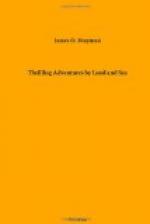“Who can the fellow be that was pursued?” said Lee; “a countryman, probably.”
“No,” replied the captain; “the patrol sufficiently distinguished him to know that he was a dragoon probably from the army, if not, certainly one of our own.”
This idea was ridiculed by Lee as improbable, as, during the whole campaign, but a single dragoon had deserted from the legion. Carnes was not convinced. Much apprehension was felt, at that time, of the effect of Arnold’s example. The captain withdrew to examine the squadron of horse, whom he had ordered to assemble in pursuance of established usage on similar occasions. He speedily returned, stating that the deserter was known; he was no less a person than the sergeant-major, who was gone off with his horse, baggage, arms, and orderly-book. Sensibly affected at the supposed baseness of a soldier, who was generally esteemed, Carnes added, that he had ordered a party to prepare for pursuit, and that he had come for written orders from the major.
In order to gain time for Champe, Lee expressed his belief, that the sergeant had not deserted, but had merely taken the liberty to leave camp upon private business or pleasure; an example, Lee said, too often set by the officers themselves, destructive as it was of discipline, opposed as it was to orders, and disastrous as it might prove to the corps in the course of the service.
Some little delay was thus interposed. Carnes began to grow impatient at what seemed the long-winded and unseasonable discourse. It being, at length announced, that the pursuing party were in readiness, Major Lee directed a change in the officer, giving the command to Cornet Middleton. His object was to add to the delay. He knew, moreover, that, from the tenderness of his disposition, Middleton would be reluctant to do any personal injury to Champe, in the event of a pursuit.
Within ten minutes Middleton appeared to receive his orders, which were delivered to him, made out in the customary form, and signed by the major. The directions were, to pursue as far as could be done with safety, Sergeant Champe, who was suspected of deserting to the enemy, and of having taken the road to Paulus Hook; to bring him alive to camp, that he might suffer in the presence of the army, but to kill him if he resisted or attempted to escape after being taken.
Detaining the cornet a few minutes longer, in advising him what course to pursue—urging him to take care of the horse and accoutrements, if taken—and enjoining him to be on his guard, lest he might, by a too eager pursuit, improvidently fall into the hands of the enemy—Lee dismissed Middleton and his party. A shower of rain had fallen soon after Champe’s departure, which enabled the pursuing dragoons to find the trail of his horse; for, at that time, the horses being all shod by our own farriers, the shoes were made in the same form which, with a private mark annexed to the fore shoes, and known to the troopers, pointed out the trail of our dragoons, and, in this way, was often useful.




